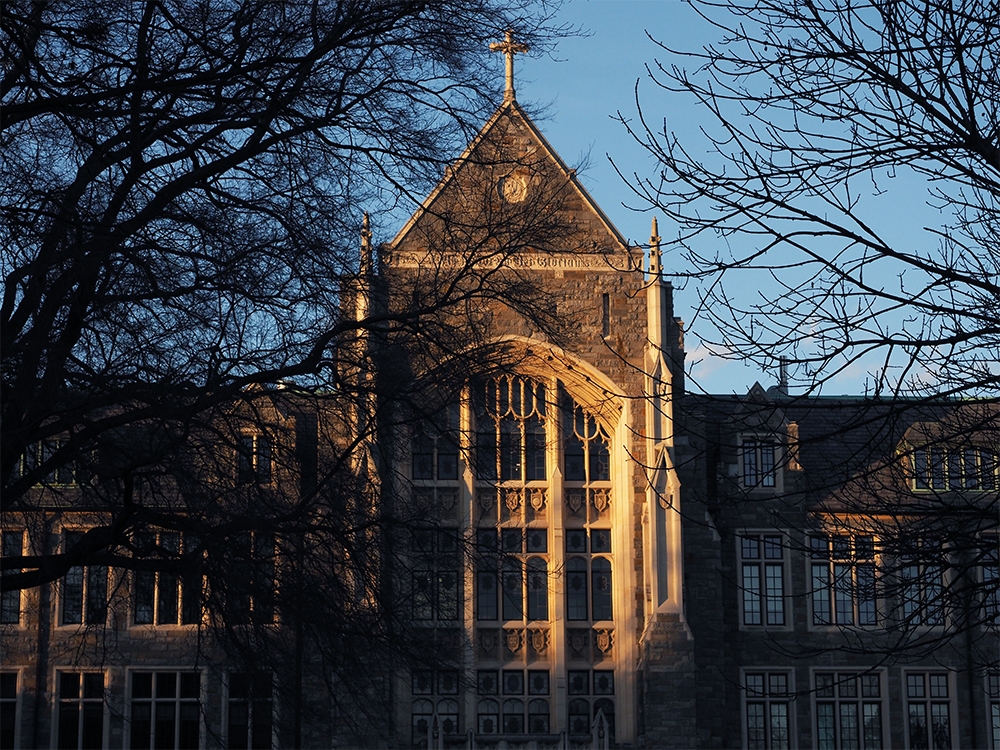Georgetown University will waive the standardized testing requirement for prospective undergraduates should the COVID-19 pandemic preclude them from sitting for a test.
The policy is one of several adjustments the university has made to its undergraduate admissions process in response to the COVID-19 pandemic. Georgetown decided to implement a temporary “test-flexible” application over the summer. More than 1,240 of the nation’s 2,330 schools granting bachelor’s degrees, including all eight Ivy League schools, have also chosen to relax testing requirements.

While College Board and ACT, Inc. will offer SAT and ACT tests throughout the fall, the pandemic has limited access students may otherwise have had to the tests. Additionally, many high school students have been unable to visit college campuses or speak with interviewers in person because of campus shutdowns or risk of infection.
Besides hosting all undergraduate admissions events virtually for at least the fall 2020 semester, Georgetown will be flexible in working with schools that may decide on nontraditional grade policies during the pandemic, according to Georgetown’s COVID-19 admissions updates for prospective students.
Georgetown plans to reintroduce mandatory standardized testing in the future because the data tests provide can make the application process more equitable, according to Charles Deacon (CAS ’64, GRD ’69), dean of undergraduate admissions.
“There is good data that shows the disparity in testing performance among groups of test takers, especially low income students or non native speakers of English,” Deacon wrote in an email to The Hoya. “The benefit of having the data is that you can control for these differences as opposed to the alternative of eliminating them leaving you with no reliable data to control for the biases of the reviewers in a more subjective review process.”
But even before the pandemic, other schools’ admissions officers expressed concern about the racial disparities and accessibility difficulties caused by requiring SAT and ACT tests, according to a June 26 article in Georgetown’s THE FEED, published by the Office of Advancement.
“Well before the COVID-19 pandemic, higher education leaders were increasingly voicing concerns that the SAT and ACT exacerbate racial and ethnic disparities in educational access,” the article said. “Then, COVID-19-related shutdowns canceled spring and summer testing sessions, preventing at least one million first-time SAT-takers in the high school Class of 2021 from completing the exams.”
Deacon said another challenge admissions offices must overcome is not being able to meet face-to-face with prospective students, forcing admissions offices to find new ways to engage students.
“We are continuing to conduct daily virtual orientation sessions and tours as well as conducting outreach to applicants through Zoom vs physical visits to states and high schools,” Deacon wrote.
Deacon said, while staff and applicants both prefer interacting in person, adding a virtual component to admissions cycles in the future may expand the office’s reach.
“In the future, a blend of in person and virtual programs will allow us to reach more students, particularly those who do not have the resources to travel to Washington to visit campus in person,” Deacon wrote.
Georgetown’s independent application makes the process as personal as possible for candidates whose interviews will have to take place virtually this year, according to a university spokesperson.
“Georgetown remains one of the only schools in the country that does not accept the Common Application, which keeps our application process as personal as possible and allows us to coordinate an alumni interview for nearly all candidates,” a university spokesperson wrote in an email to The Hoya.
Despite the challenges of the transition to a fully virtual application process, Deacon expressed optimism that the admissions office’s efforts will pay off, noting that over 7,000 students have started their applications, which is 20% higher than this same time last year. He reported a growth in the number of Black, Latinx and international applications too.
“Initially, we thought it would be difficult to recruit a similar applicant pool for next year both in size and diversity. In the last two years, we had begun to see the impact of declining numbers of high school graduates and the increasing challenge of affordability even before the pandemic,” Deacon wrote.




















